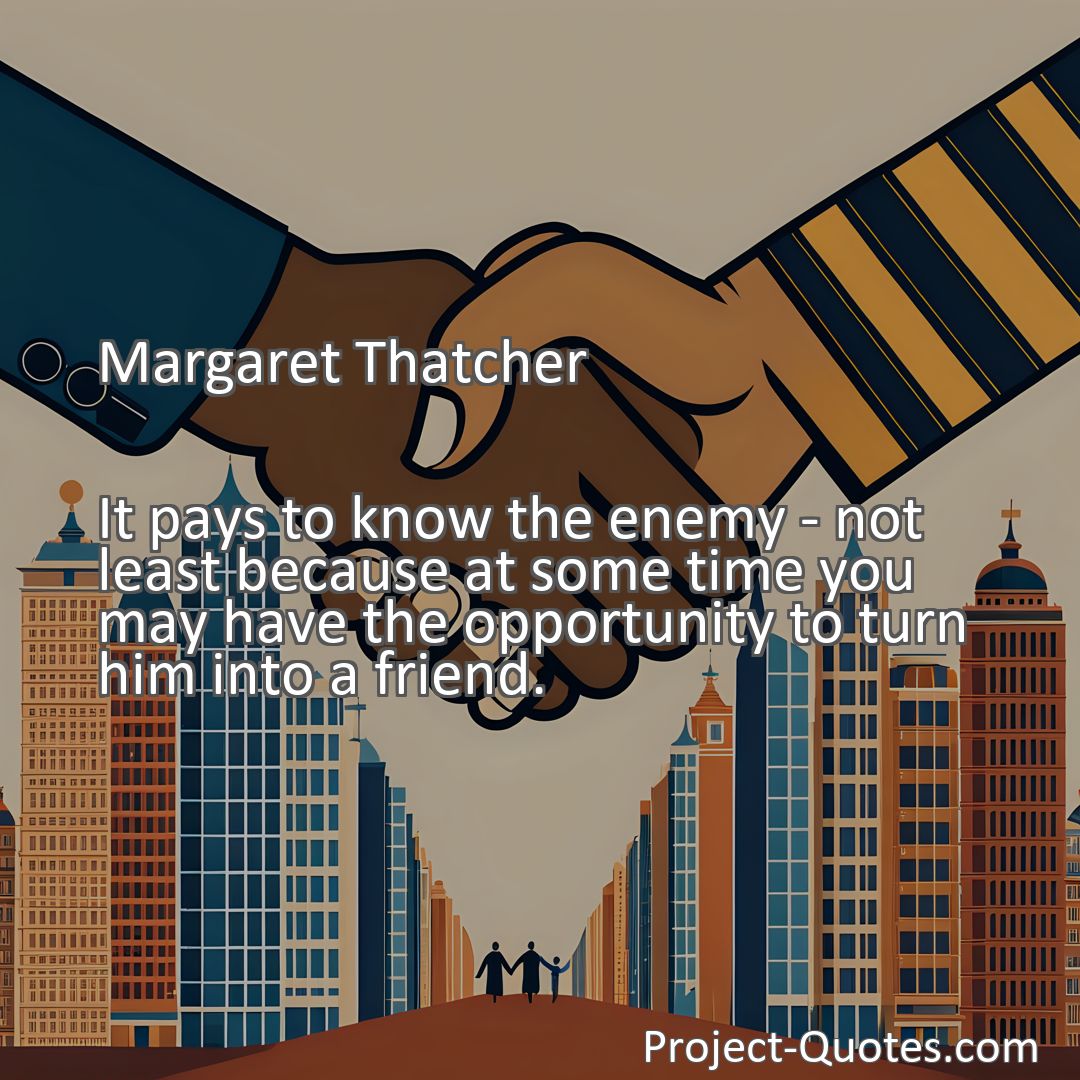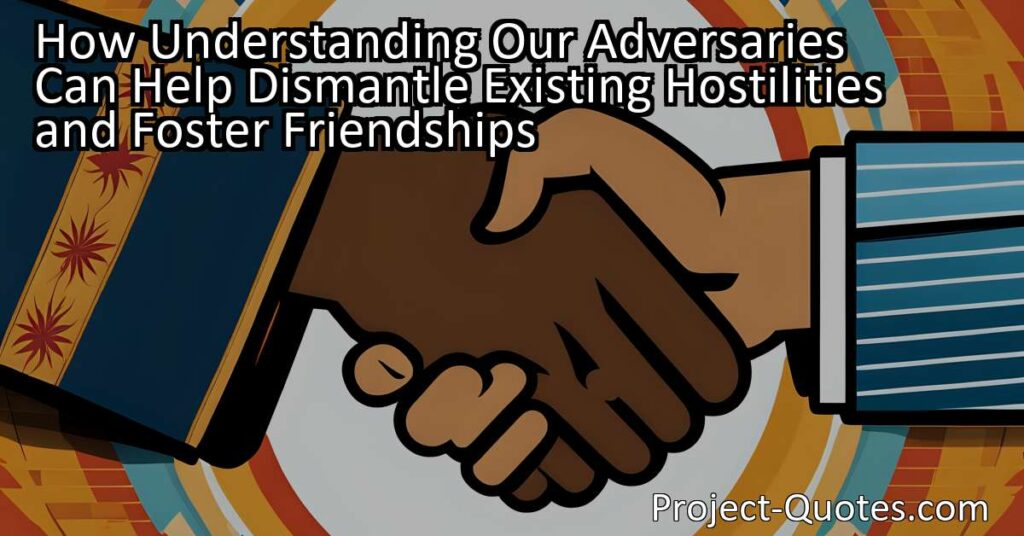It pays to know the enemy – not least because at some time you may have the opportunity to turn him into a friend.
Margaret Thatcher
Understanding our adversaries can help dismantle existing hostilities and foster friendships. By investing time and effort into comprehending our adversaries’ perspectives, exploring common ground, and fostering open communication, we can bridge the gaps that separate us and create a more harmonious world. Applying this principle to personal relationships, professional endeavors, and even international conflicts can bring about positive change and resolution.
Table of Contents
- 1 It pays to know the enemy – not least because at some time you may have the opportunity to turn him into a friend.
- 2 Margaret Thatcher
- 3 Meaning of Quote – It pays to know the enemy – not least because at some time you may have the opportunity to turn him into a friend.
- 4 Freely Shareable Quote Image
- 5 Related
Meaning of Quote – It pays to know the enemy – not least because at some time you may have the opportunity to turn him into a friend.
In Margaret Thatcher’s famous quote, she encourages us to understand our enemies because there may come a time when we can transform them into friends. This idea holds a profound truth that transcends political and personal realms. Whether it’s an interpersonal conflict or a global issue, knowing our adversaries enables us to find common ground, build bridges, and foster harmonious relationships.
At its core, this quote emphasizes the importance of empathy and a willingness to see beyond our differences. When we encounter someone we perceive as an enemy, our initial instinct may be to distance ourselves, dismiss their perspective, or even antagonize them further. However, this approach limits our ability to resolve conflicts and find suitable solutions.
To delve deeper into the significance of Thatcher’s quote, let’s explore a few scenarios where it genuinely pays off to know our adversaries before endeavoring to turn them into friends.
In personal relationships, misunderstandings and disagreements can arise, often leading to animosity and resentment. However, taking Thatcher’s wisdom to heart can help us transform these negative emotions into a foundation for reconciliation. When we make an effort to understand our partner, friend, or family member, we break down barriers and pave the way for open dialogue. By investing time and energy in learning about their background, experiences, and values, we gain insight into their perspective, thereby fostering empathy and compassion. This understanding not only strengthens our bonds but also provides an opportunity to resolve conflicts more effectively and sustain healthy relationships.
Similarly, in a professional setting, conflicts between colleagues, managers, or teams are not uncommon. These disputes can hinder productivity, damage workplace morale, and create a toxic work environment. However, by following Thatcher’s advice, organizations can employ conflict resolution strategies that focus on creating understanding and turning enemies into allies. Encouraging open lines of communication, actively listening to opposing viewpoints, and fostering a culture of empathy can help dismantle existing hostilities and transform adversaries into collaborative partners. This approach can ignite innovative ideas, enhance teamwork, and propel the organization forward.
On a larger scale, international conflicts often have devastating consequences, affecting countless lives and entire nations. History has shown that refusing to understand the adversaries’ underlying motivations and grievances can lead to prolonged animosity or even armed conflicts. However, through diplomacy, dialogue, and an earnest desire to comprehend the other side’s perspective, nations can begin the transformative process of turning enemies into friends. Familiarity with the adversaries’ grievances, cultural customs, and historical experiences can lay the foundation for peaceful resolutions, economic cooperation, and positive diplomatic relations.
Furthermore, knowing our enemies is not just about empathizing with their perspective. It also involves learning from their strategies, understanding their strengths and weaknesses, and broadening our own perspectives in the process. When we approach the situation with an open mind, we can identify potential common ground and opportunities for collaboration.
In the realm of business, companies often encounter competition. Instead of viewing rival companies as adversaries to outperform or eliminate, embracing Thatcher’s philosophy can lead to a more constructive approach. By studying their strategies, recognizing their achievements, and understanding their customer base, organizations can identify areas for growth and improvement. This shift in mindset from adversarial to cooperative can pave the way for partnerships, joint ventures, and synergistic relationships that benefit all parties involved.
In summary, Margaret Thatcher’s quote highlights the significance of understanding our enemies, as it presents an opportunity to transform them into friends. Applying this principle to our personal relationships, professional endeavors, and even international conflicts can bring about positive change. By investing time and effort into comprehending our adversaries’ perspectives, exploring common ground, and fostering open communication, we can bridge the gaps that separate us. Let us embrace Thatcher’s wisdom and strive to transform enemies into friends, creating a more harmonious and productive world.
I hope this quote inspired image brings you hope and peace. Share it with someone who needs it today!


